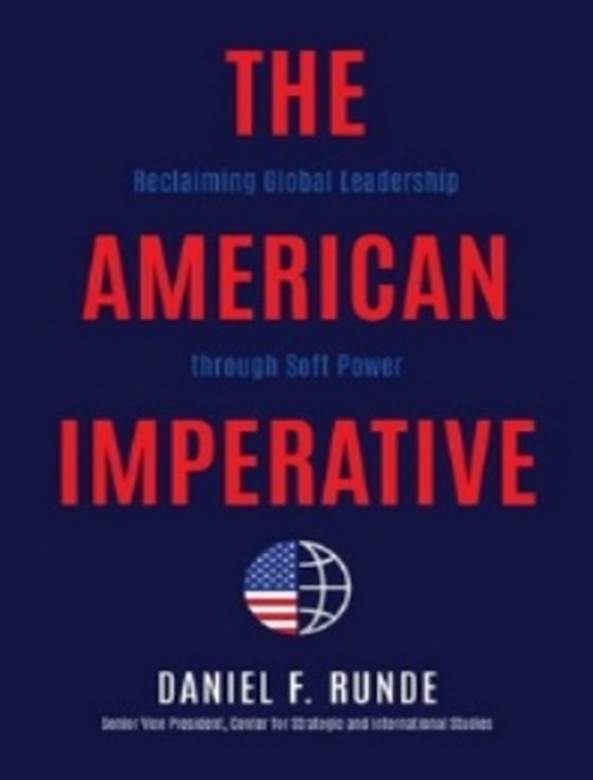

Book Review: Reclaiming Global Leadership Through Soft Power
By C. Naseer Ahmad

Daniel F Runde, Senior Vice President at the US Center for Strategic and International Studies (CSIS), one of the most dynamic and thoughtful intellectuals in Washington, has written a new book: The American Imperative: Reclaiming Global Leadership Through Soft Power published in February by Bombardier.
Runde has spent the last 20 years working on global development and American soft power. He has been a champion of greater economic engagement with Pakistan. In his book Runde accurately describes the problems Pakistan faces and dispassionately states that “a bilateral bailout from China would not address the systemic policy and governance problems underlying Pakistan’s mounting debt.”
He views a US bailout of Pakistan problematic, because in his view, the Republicans in Congress would view this as a “gift to Chinese banks.” Instead, he argues for a negotiated loan with the International Monetary Fund (IMF), which is exactly what transpired recently. In this context, Runde mentions one of his CSIS essays: “The IMF’s is not projecting power and influence, rather it seeks to help struggling nations get back on their feet.”
The book is a wake-up call for policy makers to view the world from a different lens and set aside old thinking. It is an easy read with lucid arguments for why policy makers, especially in Washington, should take notice of the world as it is now – not as they might have known through the books they read while in college. In 248 pages, organized in ten chapters, Runde takes the reader through an interesting journey and once the reader picks up the book, it will be hard to put down until one gets to the last page.
Runde starts the discussion by telling how the 2021 coup in Myanmar where the military overthrew the democratically elected government made him rethink the traditional US approach to development. Earlier in his career, Runde held senior leadership roles at the World Bank Group and served in the Bush Administration at the US Agency for International Development. He also served as an advisor to a number of Republican presidential campaigns since 2012. So, he makes the case for rethink as a practitioner and not as an academic.
The chapter titles grab the reader’s immediate attention to the message he is trying to convey. For instance, Chapter 3 – “Nations Read for Prime Time” - has a subtext “Not Your Grandparent’s Development World,” meaning that policy makers are dealing with new realities in the 21 st century with China on the March.
Runde is gifted with the ability to command not only the reader’s attention but also the audience while he is on a book tour across the country. To initiate the discussion, he asks the audience if they have read the “Ugly American” – the 1 958 political novel by Eugene Burdick and William Lederer that depicts the failures of the US diplomatic corps in Southeast Asia. He then tells the audience how deeply this book impacted then Senator John F. Kennedy, who is said to have gifted a copy to each Senate colleague.
The book presents a very lively discussion about different approaches taken by the great powers competing in the world today. Runde gives the example of the corona virus vaccines and tells the audience that the US is giving developing countries the “TGIF treatment” – a reference to the pagers big chain restaurants hand out to their customers and asking them to wait in line for a table to dine at. In the case of the corona virus vaccines, China and Russia were quick to deliver vaccines to the developing countries, even if their vaccines had a lower efficacy. With these differing approaches, China and Russia were able to accomplish more of their policy goals and earn the goodwill across the developing world, while the US came across insensitive and as a result lost the moral high ground.
The thesis of Runde’s book is that great-power competition is not going to be fought in Beijing and Moscow. Rather, it is being fought in Ukraine, the post-Soviet space, Africa, Southeast Asia, and Latin America. Development and other forms of soft power are where this competition is going to be contested.
The message Runde is conveying is that “China and Russia fill vacuums: digital vacuums, vaccine vacuums, infrastructure vacuums, vacuums in the multilateral system, commercial vacuums, security vacuums and values vacuums. The US and its allies can't fight something with nothing. We must respond with a positive agenda that meets the hopes and aspirations of our partners or they will take their business to China including in Pakistan.”

